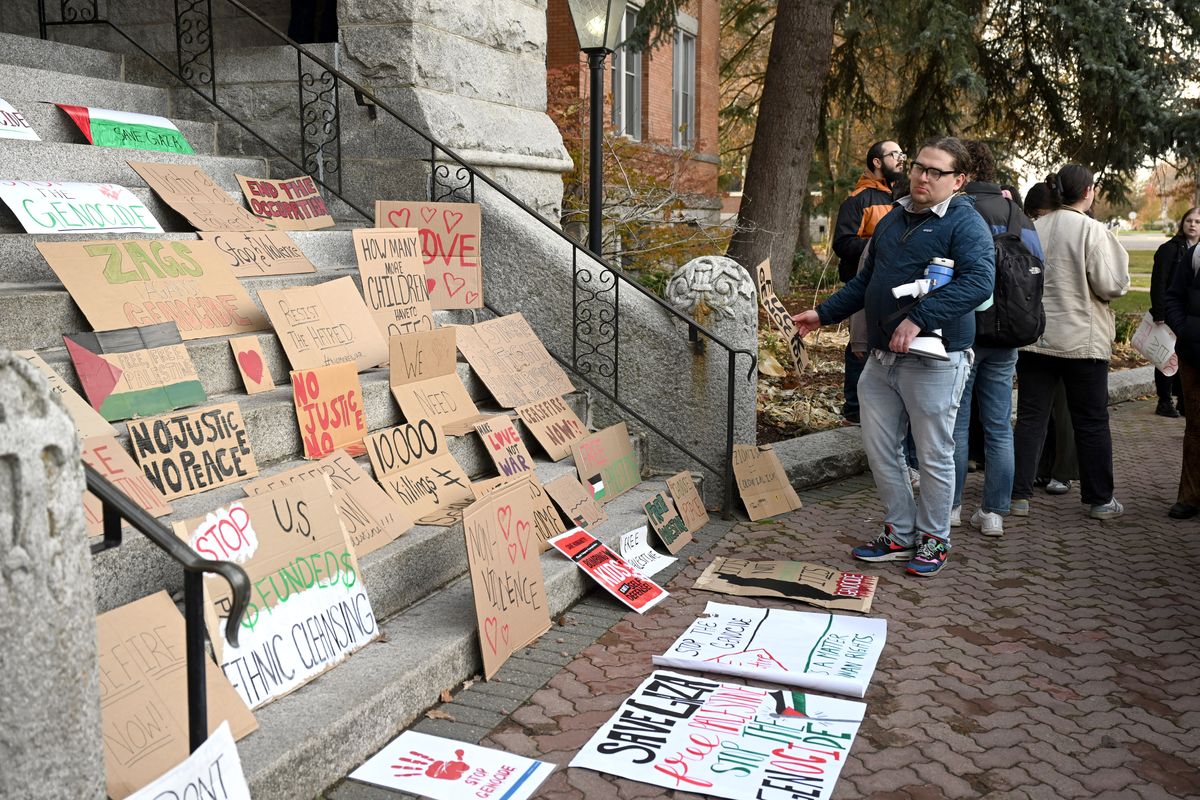‘It felt like we had to do something’: Gonzaga students hold rally, calling for ceasefire in Israel-Hamas war

Hundreds of Gonzaga students gathered on Thursday to call for a statement from university officials, urging a cease-fire in the Israel-Hamas war and condemning violence of the Israeli government against civilians in Gaza.
The university in October condemned Hamas and its reported killing of more than 1,400 Israeli civilians and capture of 240 more. Organizers of Thursday’s event want a similar public statement on the university’s part advocating for a humanitarian cease-fire in the region. The Israeli government’s military campaign in the Gaza strip has reportedly killed more than 10,000 Palestinians, nearly half of them children, according to the Ministry of Health in Ramallah.
“There’s extreme importance in spreading awareness. Silence in issues like these are complacency, and the silence from Gonzaga and president McCulloh is deafening and unbelievable in the face of these tragedies,” said Kevin Pinkelman, a Gonzaga student and one of the event organizers. “It felt like we had to do something.”
Students marched from the Foley Lawn to College Hall, chanting “Ceasefire now” and “No justice, no peace,” with homemade rally signs and delivered their letter to Provost Sacha Kopp, accepting it on President Thayne McCulloh’s behalf. Students then laid their cardboard signs on the steps of College Hall.
Noting a surge in antisemitism nationwide, organizers were steadfast that violence or hate of any kind would not be tolerated.
“We needed to make it very clear for Jewish students and just the community in general that being against the bombing of Gaza and against these atrocities isn’t antisemitic,” Pinkelman said.
Gonzaga freshman Jake Lager was walking home from class when he saw fellow Jewish Student Union member Elie Kornfeld as the rally crowd dispersed. He stopped to make sure Kornfeld was doing OK.
Kornfeld has family living in Israel and was reassured by the organizers’ commitment against antisemitism. He attended the rally to support the liberation of Palestinians and hopes the two cultures can unite in peace on land to which they both have ancestral ties, he said.
“When this happened a month ago, I felt a very deep uproar in myself because I knew that as my people were hurt, that was going to be turned into more violence, and that’s not what I believe my faith is about and my people are about,” Kornfeld said.
“It boils my blood. I’ve had a very hard month; the situation hurts. Especially being so far away and all the pain that’s going on. It feels like I can’t do anything about it, yet it feels like I can’t ignore it because that’s a privilege.”
Lager, also Jewish, didn’t attend the rally. He wants peace for all parties, which he said could be attained through the elimination of Hamas and a cease-fire.
He said he’s seen a scourge of antisemitism online since October’s events, but otherwise feels safe in person.
“It’s tough. I wish people could see things all the same way. I wish there was peace. I wish no one would fight with each other and no one would argue with each other,” he said. “It’s tough to see, it’s tough to witness, but there’s nothing I can really do besides try to spread what I think is right.”
Several university officials were present at the rally. In an emailed statement from Gonzaga spokesperson Dan Nailen, the university affirmed students’ right to peacefully assemble like at Thursday’s gathering.
“The University’s recent Prayer for Peace Gathering, led by the Muslim Student Association and the Jewish Bulldogs, as well as Gonzaga’s recent panel discussion among experts of the Palestinian and Israeli conflict, also reflect our commitment to a thoughtful exchange of ideas and respect for all persons,” the statement said. “We will continue to seek ways to fulfill these commitments.”
